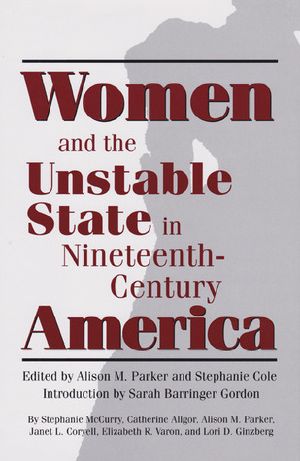Women and the Unstable State in Nineteenth-Century America

- Authors
- Parker, Alison M. & Cole, Stephanie
- Publisher
- Texas A&M University Press
- Tags
- test , history
- ISBN
- 9780890969304
- Date
- 2000-05-01T00:00:00+00:00
- Size
- 0.42 MB
- Lang
- en
Because women have always played roles crucial to the functioning of the American political system, their formal entry into electoral politics is far less unprecedented than usually thought. That underlying theme informs the findings of the six studies in this intriguing volume, which reintegrates women into nineteenth-century political theory, highlighting their participation in political life and discourse and in the negotiation of power.
In her introduction, Sarah Barringer Gordon articulates the central theme of the book: that political instability in the lives of women in the nineteenth century was tolerable at crucial periods only because of a presumption of marital stability. She further notes that these insights require rethinking women's political exclusion and complicate the understanding of formal inclusion in the political process. Stephanie McCurry examines the ethic of protection in the Confederacy as the basis for Southern loyalty and, ironically, for women's political demands during the Civil War. Catherine Allgor looks at the role of elite women securing patronage for their husbands in early Washington, while ostensibly protecting them from its corrupting influence. Alison Parker explores the radical political thought of Frances Wright and the implications of reactions to her egalitarianism.
The difficulties and persistence of partisan political work by women in the late antebellum period inform Janet Coryell's perceptive analysis of Anna Ella Carrol. Elizabeth Varon elucidates the strategic advantages of political instability for women and the significance of the cry for women's rights as a threat to the defeated South through her study of the postwar patronage career of Union spy "Crazy Bet" Van Lew. In the concluding essay, Lori Ginzberg analyzes the relationship between structures of formal governance (the ballot) and private governance (marriage) in sustaining women's political marginality.